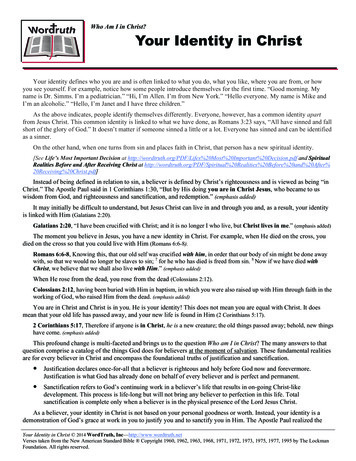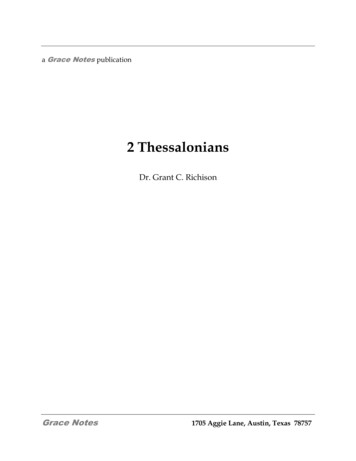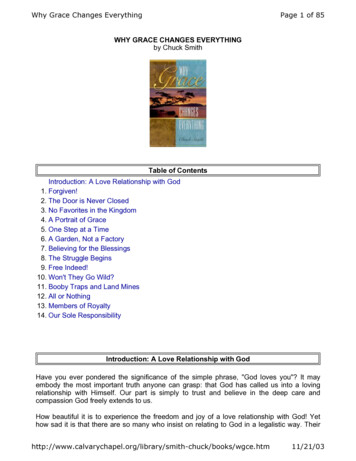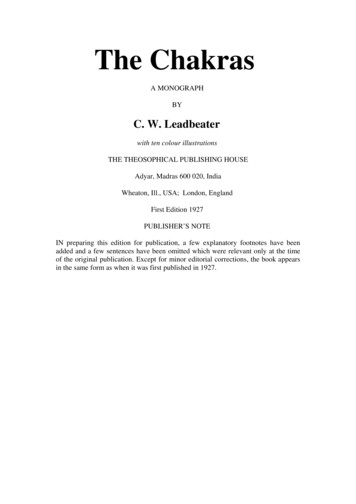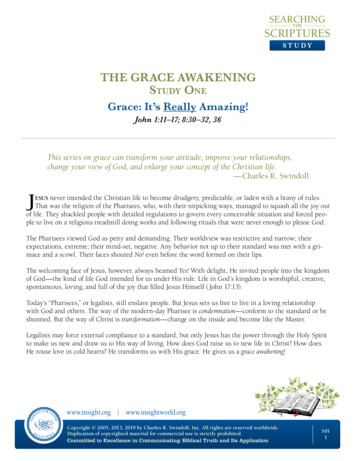
Transcription
ST U DYTHE GRACE AWAKENINGStudy OneGrace: It’s Really Amazing!John 1:11–17; 8:30–32, 36This series on grace can transform your attitude, improve your relationships,change your view of God, and enlarge your concept of the Christian life.—Charles R. SwindollJnever intended the Christian life to become drudgery, predictable, or laden with a litany of rules.That was the religion of the Pharisees, who, with their nitpicking ways, managed to squash all the joy outof life. They shackled people with detailed regulations to govern every conceivable situation and forced people to live on a religious treadmill doing works and following rituals that were never enough to please God.esusThe Pharisees viewed God as petty and demanding. Their worldview was restrictive and narrow; theirexpectations, extreme; their mind-set, negative. Any behavior not up to their standard was met with a grimace and a scowl. Their faces shouted No! even before the word formed on their lips.The welcoming face of Jesus, however, always beamed Yes! With delight, He invited people into the kingdomof God—the kind of life God intended for us under His rule. Life in God’s kingdom is worshipful, creative,spontaneous, loving, and full of the joy that filled Jesus Himself ( John 17:13).Today’s “Pharisees,” or legalists, still enslave people. But Jesus sets us free to live in a loving relationshipwith God and others. The way of the modern-day Pharisee is condemnation—conform to the standard or beshunned. But the way of Christ is transformation—change on the inside and become like the Master.Legalists may force external compliance to a standard, but only Jesus has the power through the Holy Spiritto make us new and draw us to His way of living. How does God raise us to new life in Christ? How doesHe rouse love in cold hearts? He transforms us with His grace. He gives us a grace awakening!www.insight.org www.insightworld.orgCopyright 2005, 2013, 2019 by Charles R. Swindoll, Inc. All rights are reserved worldwide.Duplication of copyrighted material for commercial use is strictly prohibited.Committed to Excellence in Communicating Biblical Truth and Its ApplicationS011
THE GRACE AWAKENINGStudy OneGrace: It’s Really Amazing!ST U DYJohn 1:11–17; 8:30–32, 36PREPARE YOUR HEARTThis series on grace is an invitation to freedom. Lately, you may have been feeling as though you’re: Imprisoned behind thick bars of petty concerns and critical opinions Locked in a cage of duties and demands, viewing only failure in yourself and others Confined to a rule-following, survival mind-set that lacks true satisfactionIf so, take hope. By receiving and responding to grace through Jesus, God’s Spirit can change your attitudefrom negative to positive, improve your relationships as you become less intolerant and controlling and morejoyful and accepting, and alter your perspective of God from fearful and guilt-ridden to vulnerable and secure.Take a few moments to quiet your spirit and invite the Lord to minister to you through His Word. Use thefollowing space to write down areas of your life in which you want to invite God’s Spirit of grace to awakenand free you.Now, let’s open God’s Word and acquire insight from the apostle John, a hopeful promise from Jesus, and awarning from the apostle Paul.Copyright 2005, 2013, 2019 by Charles R. Swindoll, Inc. All rights are reserved worldwide.Duplication of copyrighted material for commercial use is strictly prohibited.Committed to Excellence in Communicating Biblical Truth and Its ApplicationS012
THE GRACE AWAKENINGStudy OneGrace: It’s Really Amazing!ST U DYJohn 1:11–17; 8:30–32, 36YOUR TURN IN THE SCRIPTURESRead the following verses from the New Living Translation. As you read, highlight with your cursor or circlekey words or phrases in each of the passages. Underline words that repeat. Note contrasts by drawing a linebetween the contrasting words (for example, slave and son in John 8:34–36).John’s Insight into the Nature of JesusSo the Word became human and made his home among us. He was full of unfailing love and faithfulness. And we have seen his glory, the glory of the Father’s one and only Son. . . . From his abundancewe have all received one gracious blessing after another. For the law was given through Moses, butGod’s unfailing love and faithfulness came through Jesus Christ. ( John 1:14, 16–17)Jesus’ Promise of FreedomJesus said to the people who believed in him, “You are truly my disciples if you remain faithfulto my teachings. And you will know the truth, and the truth will set you free.” . . . Jesus replied,“I tell you the truth, everyone who sins is a slave of sin. A slave is not a permanent member ofthe family, but a son is part of the family forever. So if the Son sets you free, you are truly free.”( John 8:31–32, 34–36)Paul’s Warning about Grace-KillersSo Christ has truly set us free. Now make sure that you stay free, and don’t get tied up again in slavery to the law. (Galatians 5:1)Let’s dig a little deeper into these verses by using our skills of observation.Observation: Urgent Words from John, Jesus, and PaulIn his book on which these studies are based, Searching the Scriptures: Find the Nourishment Your Soul Needs,Chuck Swindoll writes that observation is “the process of seeing what the Bible actually says. You’re notanswering questions at this point. You’re not adding something through your imagination. You’re simply reading the words on the page.” 1 Observe carefully the verses you just read to answer the followingquestions.Copyright 2005, 2013, 2019 by Charles R. Swindoll, Inc. All rights are reserved worldwide.Duplication of copyrighted material for commercial use is strictly prohibited.Committed to Excellence in Communicating Biblical Truth and Its ApplicationS013
THE GRACE AWAKENINGStudy OneGrace: It’s Really Amazing!ST U DYJohn 1:11–17; 8:30–32, 36At a point in time, Jesus, who existed as “the Word” before time began ( John 1:1), “became human” (1:14).According to John 1:14, 16–17, what did Jesus do as a human? What can we receive from Him?According to the New American Standard Bible, Jesus was “full of grace and truth” (1:14 NASB). What doesthe NASB translation say we receive from Jesus (1:16)? How does what we receive from Jesus contrast withwhat the Jews received from Moses (1:17)?John’s insight was this: Moses gave the law, but Jesus gave so much more. In fact, the law of Moses pointed people to two aspects of Jesus’ divine nature that only Jesus could offer: grace and truth.Now let’s move on to John 8:31–32 and 8:34–36. What is the contrast between the results of sin and theresults of Jesus’ truth?What promise did Jesus give His followers?Copyright 2005, 2013, 2019 by Charles R. Swindoll, Inc. All rights are reserved worldwide.Duplication of copyrighted material for commercial use is strictly prohibited.Committed to Excellence in Communicating Biblical Truth and Its ApplicationS014
THE GRACE AWAKENINGStudy OneGrace: It’s Really Amazing!ST U DYJohn 1:11–17; 8:30–32, 36So, in summary, Jesus gives us grace and truth, and His truth sets us free. Paul brought this same message tothe Galatian Christians. “For no one,” Paul declared, “will ever be made right with God by obeying the law”(Galatians 2:16). Once saved by grace, they could follow Christ’s teaching to love God and others throughthe power of the Holy Spirit. However, legalistic leaders killed the grace message of the gospel. They taughtthat the Galatians must observe all the rituals of the Mosaic law to be right with God. What was Paul’swarning in Galatians 5:1?Interpretation: Understanding Grace and Its ImplicationsInterpretation is discovering the meaning of a passage. In this case, let’s weave into truth statements thethree sections of Scripture we’ve studied. Below, summarize what you’ve learned about grace from John,Jesus, and Paul.Correlation: Case Study of Grace in ActionRather than define grace in two-dimensional terms, the Bible paints portraits of grace that breathe life intothe concept. Even the Hebrew term for grace conjures a vivid image. The word is chen, meaning “to bend orstoop.” The picture is of a superior showing kindness and favor by stooping to an inferior’s level.Grace can be read between every line of every story Jesus told. From the Good Samaritan to the story of theProdigal Son, grace rubs off the pages like newspaper ink. Offering a striking contrast between grace andlaw, the story of the woman caught in adultery reveals a unique encounter with Jesus as well as with theCopyright 2005, 2013, 2019 by Charles R. Swindoll, Inc. All rights are reserved worldwide.Duplication of copyrighted material for commercial use is strictly prohibited.Committed to Excellence in Communicating Biblical Truth and Its ApplicationS015
THE GRACE AWAKENINGStudy OneGrace: It’s Really Amazing!ST U DYJohn 1:11–17; 8:30–32, 36legalistic Pharisees. It is a heart-stirring illustration of the power of grace to free a sinner from both the sinthat enslaves and the law that condemns. Read the story in John 8:1–11, and comment below on the principles you learn about transformation through grace.Application: Practical ExpectationsJesus stepped into a world of grace-killing legalists, but their darkness could not extinguish His light. Whatcan we expect when we invite Christ to shine the light of His grace in our lives? We can expect to gain a new respect for God’s gifts to us and others. We gain a new appreciation for thegifts of salvation, joy, laughter, beauty, friendship, and the amazing release of forgiveness—bothgiven to and received from others. We can expect to spend less time and energy being critical and concerned about others’ choices. We learn toaccept others just as Christ accepts them. We can expect to become more tolerant and less judgmental. Transformed by grace, we focus less on people’s appearance and more on substance, less on externals and more on character. We can expect to take a giant leap toward spiritual maturity. When we receive grace, we want to showgrace. We become more like Christ in how we love others.Which of these expectations strikes you as a need in your life?Share this need with someone who can pray for you as you learn more about grace and absorb it intoyour life.Copyright 2005, 2013, 2019 by Charles R. Swindoll, Inc. All rights are reserved worldwide.Duplication of copyrighted material for commercial use is strictly prohibited.Committed to Excellence in Communicating Biblical Truth and Its ApplicationS016
THE GRACE AWAKENINGStudy OneGrace: It’s Really Amazing!ST U DYJohn 1:11–17; 8:30–32, 36A FINAL PRAYERFather, I invite You to mold my heart as a potter molds clay and creates a vessel for good use. Sprinkle Yourgrace on me like warm rain. Remove from me the abrasive pebbles of sin that cut others. Smooth out my roughparts with Your gentle yet persistent hand. Shape me as You shaped clay at creation. Breathe on me, and bringme to life through the power of Your Spirit. In the name of Your Son, amen.ENDNOTE1.Charles R. Swindoll, Searching the Scriptures: Find the Nourishment Your Soul Needs (Carol Stream, IL: Tyndale House, 2016), 71.Copyright 2005, 2013, 2019 by Charles R. Swindoll, Inc. All rights are reserved worldwide.Duplication of copyrighted material for commercial use is strictly prohibited.Committed to Excellence in Communicating Biblical Truth and Its ApplicationS017
ST U DYTHE GRACE AWAKENINGStudy TwoThe Free GiftEphesians 2:1–13In order for there to be a demonstration of grace, there must be an acknowledgement that I have nothing in myself to give back to God. I am dependent uponChrist to do for me what I cannot do for myself.—Charles R. SwindollTmost dangerous heresy is that we can merit God’s favor through our efforts. On the surface, this lieappears valid. In our culture, we celebrate hard work and self-made success. We’re proud to wear on oursleeves the stripes of a strong work ethic. As the saying goes, “God helps those who help themselves,” right?So what’s the error?heSlinking in the shadows of the self-effort heresy is self-worship—boasting in our works rather than trustingGod’s work on our behalf. Since God does all the work of our salvation through Christ, He should get all theglory.The biblical account of the Tower of Babel illustrates how far people will go to take God’s glory from Him.According to the biblical account, the people schemed,“Come, let’s build a great city for ourselves with a tower that reaches into the sky. This will make usfamous and keep us from being scattered all over the world.” (Genesis 11:4)The structure likely resembled an ancient Babylonian ziggurat—a cone-shaped tower with a spiral staircaseleading to a zodiac-inscribed pinnacle designed to represent heaven. Note the emphasis on human effort,“Come, let’s build,” and self-glory, “This will make us famous.” The Living Bible identifies this tower as theidol it was: “a proud, eternal monument to themselves” (11:4 TLB). God stopped the blasphemous project byconfusing the people’s languages and scattering them (11:5–9).www.insight.org www.insightworld.orgCopyright 1988, 1990, 1996, 2004, 2013, 2019 by Charles R. Swindoll, Inc. All rights are reservedworldwide. Duplication of copyrighted material for commercial use is strictly prohibited.Committed to Excellence in Communicating Biblical Truth and Its ApplicationS021
THE GRACE AWAKENINGStudy TwoThe Free GiftST U DYEphesians 2:1–13The heresy of human effort has tempted many people to erect towers of good works that come short ofheaven. But to warn is not enough; we must also declare the truth we deny when we boast in our works,namely, God’s sufficiency expressed through His saving grace.PREPARE YOUR HEARTThrough prayer, we open our hands to receive God’s truth from His Word like bread from heaven. Take amoment to pray for the following: Wisdom—the ability to see God’s view of our salvation Insight—the ability to grasp the true meaning of saving grace Understanding—the ability to put grace into practiceAmong the ancient ziggurats in Mesopotamia lived a man named Abraham, an idol worshiper who wouldbecome the archetype of grace. In the world’s eyes, if ever there was a man who could have climbed his wayto try to reach heaven, it was wealthy and respected Abraham. But as we’ll read in Romans 4:1–5, God savedAbraham not by his works but through his faith.YOUR TURN IN THE SCRIPTURESRead the following verses from the New Living Translation. As you read, highlight with your cursor ormark with a pen key words or phrases. Underline repeated words. Note contrasts by drawing a dotted linebetween the contrasting words (for example, work and faith), and draw a solid line between similar words(for example, believed and faith).Copyright 1988, 1990, 1996, 2004, 2013, 2019 by Charles R. Swindoll, Inc. All rights are reservedworldwide. Duplication of copyrighted material for commercial use is strictly prohibited.Committed to Excellence in Communicating Biblical Truth and Its ApplicationS022
THE GRACE AWAKENINGStudy TwoThe Free GiftST U DYEphesians 2:1–13Abraham was, humanly speaking, the founder of our Jewish nation. What did he discover about beingmade right with God? If his good deeds had made him acceptable to God, he would have had something to boast about. But that was not God’s way. For the Scriptures tell us, “Abraham believed God,and God counted him as righteous because of his faith.” When people work, their wages are not a gift,but something they have earned. But people are counted as righteous, not because of their work, butbecause of their faith in God who forgives sinners. (Romans 4:1–5)Observation: Defending TruthUse your skills of observation to look closer at these verses and find the answers to the following questions.God’s Work . . . Not Human EffortWhat truth did Abraham discover about being made right with God?Notice the words that describe the heresy of effort-based salvation: good deeds, boast, work, wages, and earned.What words describe the truth of God’s method of salvation?We work hard, and on payday we receive our wages. How hard must we work to earn salvation? Wecan’t work hard enough! —Chuck SwindollCopyright 1988, 1990, 1996, 2004, 2013, 2019 by Charles R. Swindoll, Inc. All rights are reservedworldwide. Duplication of copyrighted material for commercial use is strictly prohibited.Committed to Excellence in Communicating Biblical Truth and Its ApplicationS023
THE GRACE AWAKENINGStudy TwoThe Free GiftST U DYEphesians 2:1–13Free Gift . . . Not Earned WageIn our earthly economy, employers reward work by giving wages; however, in heaven’s economy, Godrewards faith with a gift. What is the substance of God’s gift? In other words, what did God credit toAbraham in response to his faith?Jesus paid the final payment for sin. He did the work, so we receive the gift of salvation free.—Chuck SwindollInterpretation: Explaining GraceWhen God forgives sinners, even though they don’t deserve to be forgiven, He demonstrates grace. Hismeans of extending His grace is justification. Commentator Donald Barnhouse explained justification usingAbraham as an example.The day came when, in the accounting of God, ungodly Abraham was suddenly declaredrighteous. There was nothing in Abraham that caused the action; it began in God and wentout to the man in sovereign grace. Upon a sinner the righteousness of God was placed. Inthe accounting the very righteousness of God was reckoned, credited, and imputed. TheLord God Himself, by an act of grace moved by His sovereign love, stooped to the record andblotted out everything that was against Abraham, and then wrote down on the record thatHe, God, counted, reckoned, credited, imputed this man Abraham to be perfect even at amoment when Abraham was ungodly in himself. That is justification.1How might you explain justification to someone?Copyright 1988, 1990, 1996, 2004, 2013, 2019 by Charles R. Swindoll, Inc. All rights are reservedworldwide. Duplication of copyrighted material for commercial use is strictly prohibited.Committed to Excellence in Communicating Biblical Truth and Its ApplicationS024
THE GRACE AWAKENINGStudy TwoThe Free GiftST U DYEphesians 2:1–13According to Romans 5:1, what did Paul say is the result of our justification?Our ConditionNote below what the following passages say about our condition before being made right with God.Romans 5:12–14Ephesians 2:1–3, 12Copyright 1988, 1990, 1996, 2004, 2013, 2019 by Charles R. Swindoll, Inc. All rights are reservedworldwide. Duplication of copyrighted material for commercial use is strictly prohibited.Committed to Excellence in Communicating Biblical Truth and Its ApplicationS025
THE GRACE AWAKENINGStudy TwoThe Free GiftST U DYEphesians 2:1–13God’s SolutionWhat is God’s solution to our hopeless condition?Romans 5:18–19Ephesians 2:4–9While we were in bondage to our sin and shackled to our ways, grace came to the rescue. Grace was the keythat unlocked our prison door and set us free. How did Paul describe grace, according to Romans 5:20?In his message, Chuck Swindoll summed up grace’s amazing power. Where sin overflowed, grace flooded in. Where sin measurably increased, grace immeasurably increased. Where sin was finite, grace was infinite. Where sin was colossal, grace was super-colossal!Copyright 1988, 1990, 1996, 2004, 2013, 2019 by Charles R. Swindoll, Inc. All rights are reservedworldwide. Duplication of copyrighted material for commercial use is strictly prohibited.Committed to Excellence in Communicating Biblical Truth and Its ApplicationS026
THE GRACE AWAKENINGStudy TwoThe Free GiftST U DYEphesians 2:1–13Correlation: Case Study of Grace in ActionThe thief on the cross is a classic example that God’s grace is not based on human effort. Read the scene inLuke 23:39–43, and describe the events that occurred.The thief couldn’t have worked for his forgiveness even if he had tried. All he could do while he was hanging on that cross was believe. And in the final analysis, that’s all we can do too. Like the thief on the cross,every human hangs under sentence of death, but there’s hope in Christ!By believing in Jesus we can have our sins forgiven and a secure home in heaven. Jesus made thatpromise to the thief on the cross, and He makes it to us as well. —Chuck SwindollApplication: Offering HopeMany sincere people try to construct their own salvation. Brick by brick, they assemble their good works,hoping their tower will reach heaven but never certain it will. Thankfully, our hope rests on the strong backof Christ who lived a righteous life, bore our sin, rose from the grave, and will carry us to heaven. How didPaul explain our hope in this passage?Once we, too, were foolish and disobedient. We were misled and became slaves to many lusts andpleasures. Our lives were full of evil and envy, and we hated each other. But—When God ourSavior revealed his kindness and love, he saved us, not because of the righteous things we had done,but because of his mercy. He washed away our sins, giving us a new birth and new life through theHoly Spirit. He generously poured out the Spirit upon us through Jesus Christ our Savior. Becauseof his grace he made us right in his sight and gave us confidence that we will inherit eternal life.(Titus 3:3–7)What hope do these verses offer you?Copyright 1988, 1990, 1996, 2004, 2013, 2019 by Charles R. Swindoll, Inc. All rights are reservedworldwide. Duplication of copyrighted material for commercial use is strictly prohibited.Committed to Excellence in Communicating Biblical Truth and Its ApplicationS027
THE GRACE AWAKENINGStudy TwoThe Free GiftST U DYEphesians 2:1–13In his message, Chuck Swindoll concluded with two principles worth remembering.1. God doesn’t merely pity you; He offers you kindness, mercy, and grace.2. God not only will save you; He offers you His life.How can you hold on to these truths in the coming days when you feel insecure?Would you like to share these principles with someone who needs to hear them? Take this study on theroad! Tell someone soon about God’s amazing gift of salvation that can be theirs through faith in Christ.A FINAL PRAYERFather, thank You for giving to me all that I need and even an amount more than I could ever earn on myown. Your “superabundant” grace is much more than I deserve, and yet You offered it to me, like Abraham,the moment I believed. May Your name be uplifted today, and may You receive all the glory for ever and ever.Amen!ENDNOTE1.Donald Grey Barnhouse, God’s Remedy; God’s River, vol. 2 (Grand Rapids: Eerdmans, 1973), 208.Copyright 1988, 1990, 1996, 2004, 2013, 2019 by Charles R. Swindoll, Inc. All rights are reservedworldwide. Duplication of copyrighted material for commercial use is strictly prohibited.Committed to Excellence in Communicating Biblical Truth and Its ApplicationS028
ST U DYTHE GRACE AWAKENINGStudy ThreeThe Roots of a Grace AwakeningRomans 4:1–5; 5:1–2; Galatians 2:20When we believe in Christ, His cleansing blood washes away our sins. We areplaced into Christ and the righteousness of God is credited to our account.—Charles R. SwindollThistory, God’s liberating song of grace has been calling people to freedom. In 1738, forexample, Charles Wesley heard grace’s melody while reading Luther’s commentary on Galatians. For thefirst time, he understood salvation by faith in Christ alone, and he felt a peace that he had not found in hisyears of striving to please God. Three days later, Charles’ brother John experienced grace’s touch in a similarway. At a meeting, he listened to a reading from Luther’s preface to Romans that changed his life. John laterwrote in his journal:hroughoutI felt my heart strangely warmed. I felt I did trust in Christ, Christ alone for salvation; and anassurance was given to me that he had taken away my sins, even mine, and saved me from thelaw of sin and death.1The joy of Charles and John’s “grace awakening” could not be contained. In the years that followed, thegospel of grace flowed out in torrents through the thousands of hymns Charles wrote and the countless sermons John preached. Wherever they traveled through Europe and America, the Wesleys, along with GeorgeWhitefield, spread the news of God’s grace and flamed a movement of spiritual revivals known as the GreatAwakening.The same grace awakening that gave roots to the Great Awakening still blooms today. In this study, we’llexamine how grace awakens our spirits through our salvation. Then we’ll start a journey that will take usthrough the rest of the series to understand how our grace-based salvation blossoms into a grace-based lifestyle, radically changing every aspect of our identity and relationships.www.insight.org www.insightworld.orgCopyright 2005, 2013, 2019 by Charles R. Swindoll, Inc. All rights are reserved worldwide.Duplication of copyrighted material for commercial use is strictly prohibited.Committed to Excellence in Communicating Biblical Truth and Its ApplicationS031
THE GRACE AWAKENINGStudy ThreeThe Roots of a Grace AwakeningST U DYRomans 4:1–5; 5:1–2; Galatians 2:20PREPARE YOUR HEARTAs you prepare to study grace’s biblical roots, take a moment to pray for God’s Spirit to illumine your mindand heart. As Chuck Swindoll advised,“Study without prayer is an incomplete process—a futile effort.” 2You may wish to pray as Chuck prays before he studies the Word:I often pray, “Lord, speak to me. Help me understand what this passage is saying. I am listening. I am sensitive to Your truth. Lead me into it.” 3YOUR TURN IN THE SCRIPTURESSalvation by grace, based alone on the person and work of Jesus Christ, is the central truth of Christianity.The Bible offers no better example of grace-based salvation than the Patriarch Abraham.Observation: Explaining the Gospel of GraceAs we discovered in the previous study, the apostle Paul made much of Abraham’s example of faith — notreligious works — as the means to receiving God’s grace. Paul’s faith-versus-works distinction inRomans 4:1–3 deserves another look:Abraham was, humanly speaking, the founder of our Jewish nation. What did he discover about beingmade right with God? If his good deeds had made him acceptable to God, he would have had something to boast about. But that was not God’s way. For the Scriptures tell us, “Abraham believed God,and God counted him as righteous because of his faith.”Copyright 2005, 2013, 2019 by Charles R. Swindoll, Inc. All rights are reserved worldwide.Duplication of copyrighted material for commercial use is strictly prohibited.Committed to Excellence in Communicating Biblical Truth and Its ApplicationS032
THE GRACE AWAKENINGStudy ThreeThe Roots of a Grace AwakeningST U DYRomans 4:1–5; 5:1–2; Galatians 2:20In the previous study, we noted that our salvation is accomplished by God’s work, not human effort, and itis a free gift, not an earned wage. Let’s highlight the sentence, “‘Abraham believed God’” (Romans 4:3). Whatspecifically did Abraham believe? Read Genesis 12:1–3, and write down the promises that Abraham believedGod would fulfill.By faith, Abraham traveled to the land God showed him. Yet, even though God gave Abraham a homelandand influence, Abraham’s faith was truly tested when God delayed giving Abraham an heir. What wasAbraham’s solution to his and Sarah’s infertility (Genesis 15:1–3)?What was God’s answer? How did Abraham respond? What did God do (15:4–6)?God counting Abraham as righteous because of his faith was an act of grace. Faith is the key that unlocksthe treasure of salvation, and, according to Paul, because anyone can have faith, the treasure is available toall. Read Romans 4:16 and 4:22–25, and write down Paul’s points about Abraham being the prototype for allof humanity.Copyright 2005, 2013, 2019 by Charles R. Swindoll, Inc. All rights are reserved worldwide.Duplication of copyrighted material for commercial use is strictly prohibited.Committed to Excellence in Communicating Biblical Truth and Its ApplicationS033
THE GRACE AWAKENINGStudy ThreeThe Roots of a Grace AwakeningST U DYRomans 4:1–5; 5:1–2; Galatians 2:20What exactly did Paul mean when he wrote, “God counted [Abraham] as righteous because of his faith”(Romans 4:3, emphasis added)? For the answer, let’s begin the interpretation phase of the Searching theScriptures method of Bible study as we define justification and explore a theological principle called “positional truth.”Interpretation: Understanding Our Position in ChristA judge “counts” a person as righteous or innocent when he or she acquits or pardons a person convicted ofa crime. God does something similar at our salvation. This judicial image is at the heart of the Greek worddikaioo, often translated “justify.” Read the following verses from the New American Standard Bible thatinclude this word: But to the one who does not work, but believes in Him who justifies the ungodly, his faith is credited as righteousness. (Romans 4:5) He who was delivered over because of our transgressions, and was raised because of our justification. (4:25) Therefore, having been justified by faith, we have peace with God through our Lord Jesus Christ. (5:1)Who alone can justify, and what is the condition of those who are justified (4:5)?What event in Jesus’ life made possible our justification (4:25)?Copyright 2005, 2013, 2019 by Charles R. Swindoll, Inc. All rights are reserved worldwide.Duplication of copyrighted material for commercial use is strictly prohibited.Committed to Excellence in Communicating Biblical Truth and Its ApplicationS034
THE GRACE AWAKENINGStudy ThreeThe Roots of a Grace AwakeningST U DYRomans 4:1–5; 5:1–2; Galatians 2:20What must we do for justification to occur, and what is the result (Romans 5:1)?“Justification is the sovereign act of God whereby He declares righteous the believing sinner while stillin a sinning state.” —Chuck SwindollWe are like criminals who, having been convicted of multiple felonies, stand before a
the power of the Holy Spirit. However, legalistic leaders killed the grace message of the gospel. They taught that the Galatians must observe all the rituals of the Mosaic law to be right with God. What was Paul’s warning in Galatians 5:1? Interpretation: Understanding Grace and Its Implic


